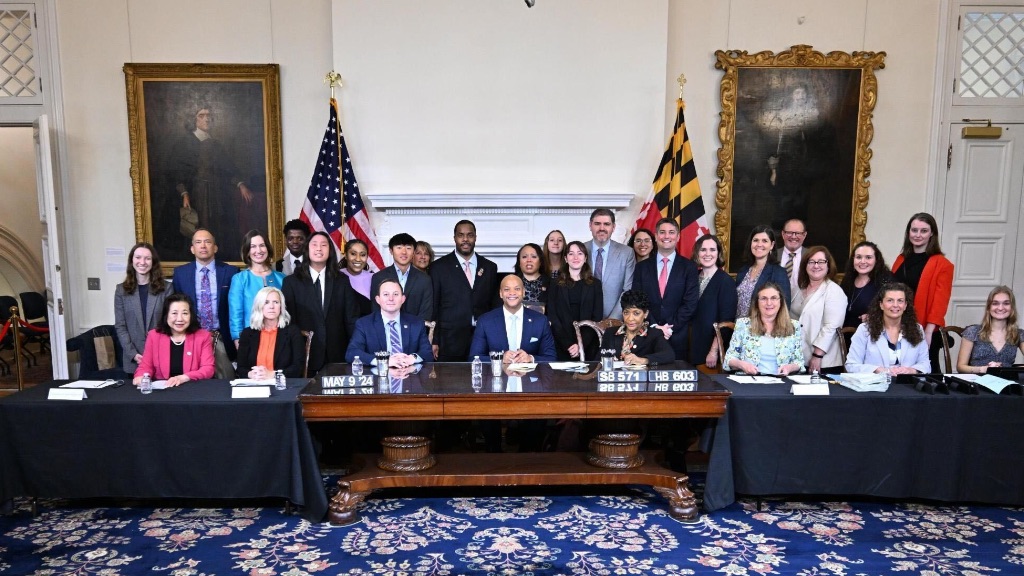Child protection laws signed in Maryland and passed in Vermont
Maryland becomes the second state to pass the Age Appropriate Design Code model with Maryland Gov. Wes Moore signing the Maryland Kids Code into law on the 9th of May 2024. The bill’s signing is a monumental achievement for children’s privacy and safety in the US. The Maryland Kids Codes journey began a year ago, with 5Rights supporting since its first introduction. This legislative session, the Maryland Kids Code, a priority bill for leadership in both chambers, went through the General Assembly with strong support and minor amendments, despite strong pushback by industry. The Code was then, on the 6th of April, unanimously passed in both the House and Senate.

The Maryland Kids Code is modelled on the highly respected Age Appropriate Design Code which is incrementally sweeping the globe in various forms as part of efforts to protect children online. With the same core standards for children’s privacy and data protection passed in California in 2022, the Maryland bill further reinforces an emerging global standard for the protection of children’s rights online.
5Rights Executive Director Leanda Barrington-Leach said:
“This is another hard-won but very deserved victory for children, for parents, for teachers, for US society as a whole. These unanimous votes show that support for the Age Appropriate Design Code’s safety-by-design and privacy-by-default principles transcends political divides. They reflect mounting public calls for smart, effective policy solutions to protect kids online. While tech companies continue to fight change, it is time to recognise that it is inevitable. Protecting and respecting children must be the price of doing business.”
Marisa Shea, Senior Policy Manager at 5Rights US, and resident of St. Mary’s County, Maryland, said:
“Here in Maryland, we just made history in the fight to hold Tech accountable. By signing the Maryland Kids Code into law, Governor Moore has chosen to put Marylands children and teens ahead of tech companies profits. We’re incredibly grateful to Delegates Jared Solomon and C.T. Wilson, along with Senators Benjamin Kramer and Chris West for their strong leadership and glad to see support for a safety-by-design and privacy-by-default model continue to grow”
The Maryland Kids Code Coalition released the following statement:
“Kids and parents in Maryland can rest a little easier tonight knowing that help is on the way to make the internet safer for young people and hold Big Tech companies accountable for their actions. We are immensely grateful to Governor Wes Moore for signing the bill into law, to the bill’s sponsors, Delegates Jared Solomon and C.T. Wilson and Senator Ben Kramer, for their bold and effective leadership, to Speaker Adrienne Jones and President Bill Ferguson for making kids’ online safety a consumer protection priority this year, and we are inspired by the Marylanders from all walks of life – parents, young people, educators, medical professionals, tech experts and more – who joined together to make their voices heard and achieve real change today.”
The Maryland Kids Code proves an integral step in the provision of privacy for and protection of children online. Companies will now be required to design online services, products, and features that are reasonably likely to be accessed by children with their best interests in mind. By passing the Kids Code, Maryland is implementing a proven model, with the Age Appropriate Design Code having been responsible for more than one hundred and twenty changes to some of the biggest platforms and products regularly used by children and teens online. Examples of changes that have been made as a result of the Age Appropriate Design Codes include: Google instituted ‘safe search’ for all under 18s; YouTube and Snapchat defaulted all accounts of under 18s to high privacy settings; Instagram stopped unknown adults from messaging children; TikTok turned off notifications through the night; Pinterest stopped showing children advertising. As shown in the latest Digital Futures for Children centre’s report Impact of regulation on children’s digital lives.
In addition to Maryland, the Vermont Legislature also worked on AADC model legislation this session. The Vermont Kids Code repeatedly received unanimous tripartisan votes, reflecting strong agreement on the importance of taking action to address the youth online privacy and safety crisis. At the end of session, the Vermont Legislature folded the provisions of the Vermont Kids Code into a comprehensive data privacy bill, H.121. This bill was unanimously passed by the Legislature, reflecting a collective resolve to protect young people in today’s chaotic digital world while also addressing broader data privacy concerns for all Vermonters.
By including AADC provisions within its Data Privacy Act, Vermont is taking a comprehensive approach to online safety – recognizing that kids need data privacy and design protections tailored to their needs. By providing additional data privacy protections for kids and focusing on upstream design, this legislative model effectively safeguards children’s online experiences from the outset using common-sense strategies to prevent exploitation and harm.
The Legislature will soon be sending the Data Privacy Act to Governor Scott, who is currently facing an onslaught of tech and business lobbying. Vermont’s lawmakers, parents, young people, educators, and medical professionals have remained steadfast in their commitment to data privacy and the Kids Code despite this incredible pressure from industry. We are hopeful Governor Scott will stand up for kids’ online safety by signing the bill, instead of bowing to industry pressure. The Governor will have to make his decision on whether to veto the bill by the 17th of June.
These changes are just the beginning. It is clear that regulation for age appropriate design can bring real benefits to children’s lived experiences. We hope and anticipate that other States will be inspired by the overwhelming legislative support in Maryland and Vermont for Children’s online privacy and protection.
